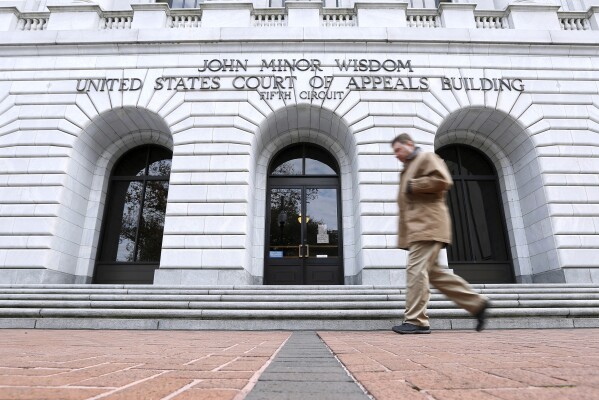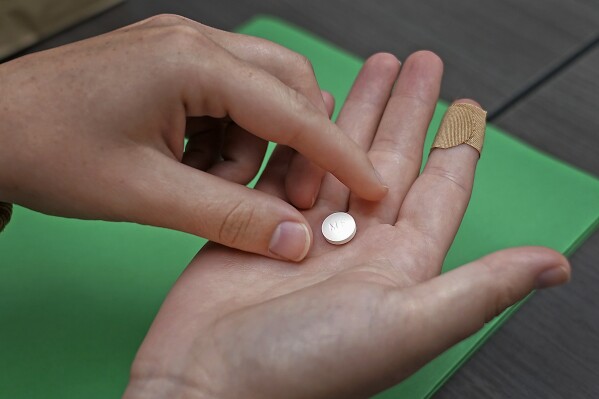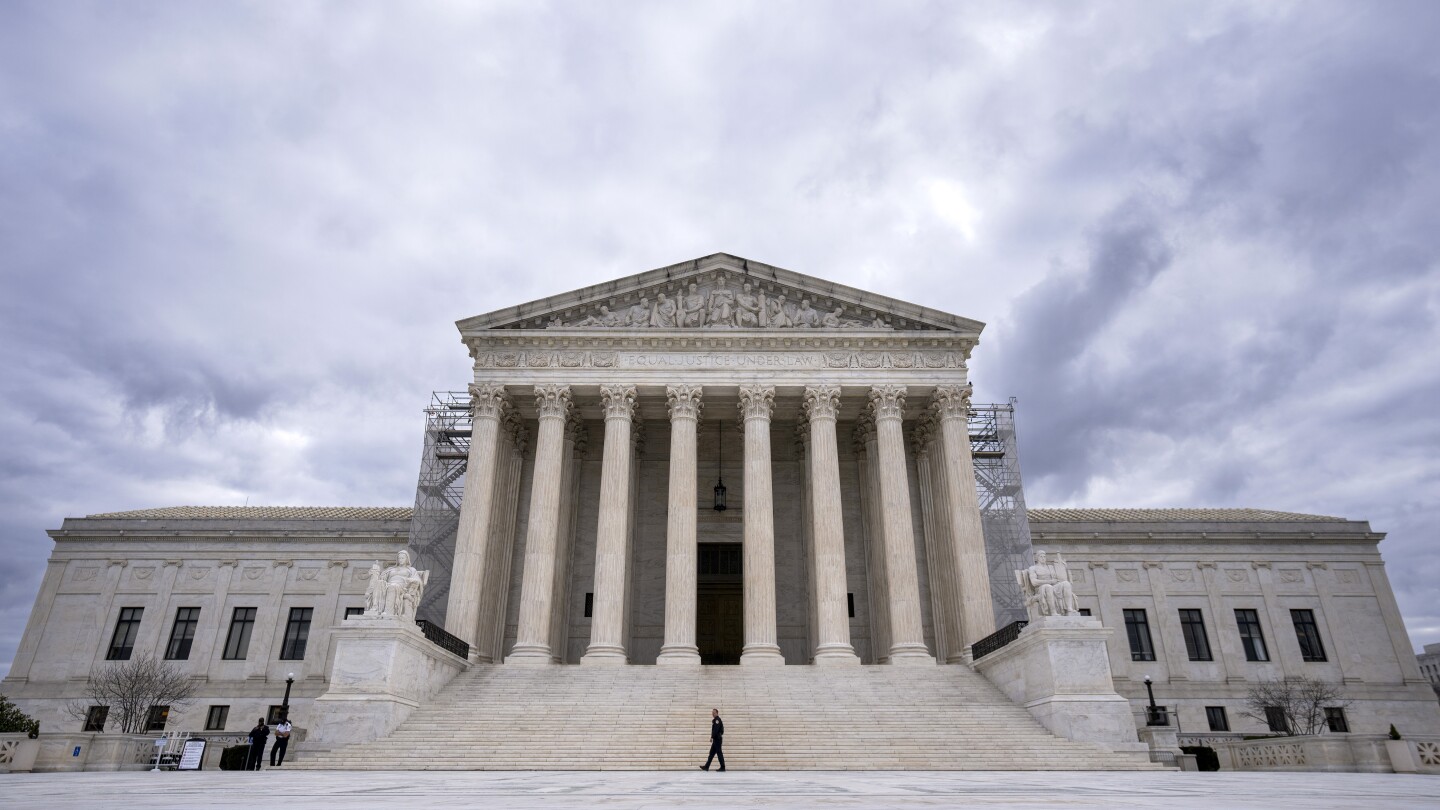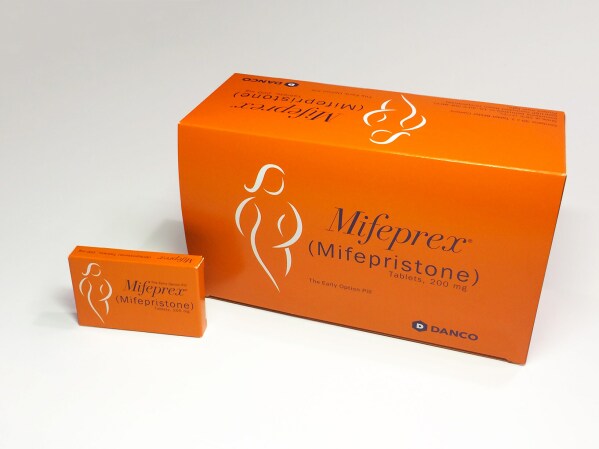The Supreme Court will again wade into the fractious issue of abortion this week when it hears arguments over a medication used in the most common way to end a pregnancy, a case with profound implications for millions of women no matter where they live in America and, perhaps, for the race for the White House.
Published [hour]:[minute] [AMPM] [timezone], [monthFull] [day], [year]
The U.S. Supreme Court will again examine the issue of abortion this week when it hears arguments over whether to limit access to mifepristone, a pill used in the most common way to end a pregnancy.
The hearing is set to begin at 10:00 a.m. EDT.
Here’s what to know:
— How safe is mifepristone? The central dispute in today’s case is whether the Food and Drug Administration overlooked serious safety problems when it made mifepristone easier to obtain, including through mail-order pharmacies. The AP dug into the pill’s safety here.
— What’s at stake? If the Supreme Court sides with the conservative groups suing the FDA, it would mean patients would no longer be able to receive mifepristone through the mail, among other major restrictions. Beyond abortion, the ruling could upend pharmaceutical regulatory processes.
— When will the Supreme Court issue a decision? The exact timing is unclear, but the court almost always issues its decisions by early summer, usually before the end of June.
The fate of mifepristone could hinge on these three judges
The outcome of the mifepristone case hinges on the votes of Justices Amy Coney Barrett, Neil Gorsuch and Brett Kavanaugh, former President Donald Trump’s three Supreme Court appointees. They were in the bare, five-vote conservative majority that overturned Roe v. Wade nearly two years ago. But they have said nothing about abortion since. Justices Samuel Alito and Clarence Thomas, the other members of the majority in 2022, have already said they would have let a lower-court ruling rolling back access to mifepristone take effect while the legal fight continues.
Most Americans have heard of mifepristone, but they’re fuzzy on the details
Here’s a look at what the polling says:
— About half of U.S. adults (54%) in a KFF poll conducted in February said they had heard of the drug mifepristone, up from 31% in January the year before.
— Most U.S. adults (55%) believe medication abortion pills are very or somewhat safe when taken as directed by a doctor, according to a KFF poll conducted in May 2023. Roughly 7 in 10 Democrats (72%) say medication abortion is safe. About 6 in 10 Independents (58%) and 4 in 10 (40%) Republicans agree. About as many Republicans (45%) say they are not sure about the safety of medication abortion.
— There is a broad lack of knowledge about how mifepristone is used outside of the context of abortion. About 2 in 10 (19%) U.S. adults are aware that medication abortion pills can be used to treat a miscarriage, while around 7 in 10 (73%) are unsure.
Demonstrators have arrived outside the courthouse
It’s a lively scene outside the Supreme Court with demonstrators occupying the streets surrounding the building. Several groups are chanting in support of abortion rights while smaller groups are marching and chanting in opposition to abortion.
The police have blocked traffic surrounding the court as well.
In front of the court, abortion opponents are giving speeches while another abortion-rights group, Aid Access, has brought robots that can deliver mifepristone as part of their mission to make the pills available in all 50 states.
Mifepristone is among “the most studied medications,” major medical associations say
Approved by the FDA in 2000, mifepristone is a component of treatment and management for early pregnancy loss or miscarriage by the U.S. Department of Health and Human Services, the American Medical Association and the American College of Obstetricians and Gynecologists.
In amicus briefs filed in support by the FDA, leading medical associations and health experts have touted the drug’s decades-long safety records and studies showing it to be safer than common drugs such as Tylenol and Viagra.

FILE – In this Dec. 12, 2007 file photo, Tylenol drugs are shown in the drug department at Costco in Mountain View, Calif. Major medical associations say mifepristone’s effectiveness is on par with over-the-counter medications such as this one. (AP Photo/Paul Sakuma, File)
Major adverse reactions to the drug are “exceedingly rare,” occurring in about 0.3% of cases, and the risk of death is near zero, according to the American Medical Association.
It is among “the most studied medications” prescribed in the country, per an amicus brief filed by the AMA, American Academy of Family Physicians and other organizations. Evidence of the drug’s safety and effectiveness is “overwhelming” and “on par with common painkillers like ibuprofen and acetaminophen,” or Tylenol, per the brief.
Sen. Elizabeth Warren says mifepristone case is about politics, not health concerns
The Democratic senator from Massachusetts said the case is not about whether medically induced abortions are safe but “Donald Trump and the Republican Party marching us to a full-on abortion ban.”
In a conference call organized by President Biden’s campaign, she noted that the FDA first found in 2000 that Mifepristone “is safe and effective” and that Americans had been using it successfully ever since.

Sen. Elizabeth Warren, D-Mass., speaks during the Senate Armed Services Subcommittee on Personnel hearing on Capitol Hill in Washington Wednesday, Dec. 6, 2023. (AP Photo/Jose Luis Magana)
Warren said that abortion bans supported by Republicans have proved so politically unpopular — even in deeply red states like Kansas and Kentucky — the party’s top leaders “have gone to the courts as if they know better than the scientific experts at the FDA about the safety of medication abortion.”
Since 2000, the FDA has repeatedly reaffirmed mifepristone’s safety and further eased restrictions on it, culminating in a 2021 decision allowing the pills to be sent through the mail.
More than six in 10 US abortions in 2023 were done by medication — a significant jump since 2020
FILE – Bottles of abortion pills mifepristone, left, and misoprostol, right, at a clinic in Des Moines, Iowa, on Sept. 22, 2010. (AP Photo/Charlie Neibergall, File)
The Guttmacher Institute, a research group that supports abortion rights, said about 642,700 medication abortions took place in 2023, accounting for 63% of abortions in the formal health care system. That’s up from 53% in 2020.
One reason? Telehealth. Doctors say it’s more convenient for patients and helps clinics meet increasing demand in states where abortion is legal.
▶ Read more about the rise in medication abortions.
Biden’s campaign draws parallels between today’s case and Roe v. Wade
Biden campaign manager, Julie Chávez Rodriguez, says the high court hearing arguments on mifepristone “could strip away medication abortion everywhere.”

Biden-Harris 2024 campaign manager Julie Chavez Rodriguez joins President Joe Biden during a visit to the Biden campaign headquarters in Wilmington, Del., Saturday, Feb. 3, 2024. (AP Photo/Alex Brandon)
Chavez said on a conference call with reporters before oral arguments began that the case potentially constitutes the “biggest step toward a nationwide abortion ban since Roe was overturned.”
The president has built his efforts to win a second term around promises to defend abortion rights.
Most Americans think abortion should be legal early in pregnancy
Here’s a look at what the polls say:
— Seventy-three percent of U.S. adults think abortion should be legal in the first six weeks of pregnancy, according to a poll from The Associated Press-NORC Center for Public Affairs Research conducted in June 2023.
— Support for early abortion extends across party lines: About 9 in 10 Democrats (88%) and 56% of Republicans say abortion should be allowed up to 6 weeks into a pregnancy.
— About two-thirds (64%) of Americans think abortion should be legal in at least some circumstances, per the same AP-NORC poll.
— Sixty percent of U.S. adults think the outcome of the 2024 election will be very important for abortion policy.
Legal standing: a technical issue that could play a decisive role in the case

The United States flag casts a shadow on the Supreme Court building on Friday, April 21, 2023, in Washington. (AP Photo/Jacquelyn Martin)
Before courts can decide the merits of a lawsuit, they have to be sure that the party making a claim has the legal right, or standing, to sue.
Standing turns, in part, on whether a person or a group that sues has been or is likely to be harmed. In the mifepristone case, the Biden administration and Danco Laboratories, the maker of the drug, dispute that the doctors and organizations that challenged the FDA’s actions have standing.
A ruling in favor of the administration and Danco on standing would leave the FDA’s decisions on mifepristone intact, and it would allow the court to resolve the matter without getting into potentially difficult issues more closely tied to abortion.
This case could upend the country’s entire regulatory structure, pharmaceutical and biotech leaders warn
Kacsmaryk’s decision last year marked the first time a court has ever ordered the FDA to withdraw the approval of a drug. An open letter signed by nearly 300 biotech and pharmaceutical company leaders last year slammed the ruling as undermining Congress’ delegated authority to the FDA to approve and regulate drugs.
If judges can unilaterally overturn drug approvals, they said “any medicine is at risk.”
“Judge Kacsmaryk’s act of judicial interference has set a precedent for diminishing FDA’s authority over drug approvals, and in so doing, creates uncertainty for the entire biopharma industry.”
A timeline: How the mifepristone case advanced to the Supreme Court
In November 2022, the Alliance for Hippocratic Medicine, a recently formed coalition of anti-abortion groups, filed a federal lawsuit against the FDA challenging the agency’s long-standing approval of mifepristone.
After a hearing in March 2023, U.S. District Judge Matthew Kacsmaryk in the Texas panhandle city of Amarillo sided with the AHM in an April ruling that would have blocked the FDA’s approval of mifepristone. Later that month, the FDA, Department of Justice and Danco Laboratories, the manufacturer of mifepristone, appealed the ruling to the 5th Circuit Court of Appeals.

FILE – A man walks in front of the 5th U.S. Circuit Court of Appeals, Jan. 7, 2015, in New Orleans. (AP Photo/Jonathan Bachman, File)
On April 12, 2023, the 5th Circuit Court of Appeals pared back aspects of Kacsmaryk’s ruling, declining to block the FDA’s approval of the drug but turning back the clock to the prescribing requirements before 2016. This removed later changes to rules that made mifepristone easier to access.
The U.S. Supreme Court then intervened to pause the lower courts’ decisions, maintaining mifepristone access as the case plays out. In December, the court agreed to hear the case.
What is Danco Laboratories?
One name that might come up in today’s hearing: Danco Laboratories. The company is the small drugmaker that makes brand-name mifepristone, which it sells under the name Mifeprex.
The pill is Danco’s only product and the company says that a ruling against mifepristone would seriously jeopardize its business. The New York-based drugmaker is not publicly traded and does not report sales or other details about Mifeprex’s use.
Lawyers for Danco have joined with the Biden administration in calling for mifepristone to remain available under its currently approved terms.
Another drugmaker that makes a generic version of mifepristone, GenBioPro, has said it would also be required to adopt any restrictions handed down by the court.
When will the Supreme Court decide the case?
The Supreme Court almost always issues its decisions by early summer, usually before the end of June. The mifepristone case could be one of the last cases decided — both because it involves the highly contentious issue of abortion and because it is being argued relatively late in the court’s term.
The court never says which cases are being decided on any given day.
Most Americans oppose a ban on mifepristone
Here’s a look at what the polling says:
— About two-thirds (66%) of U.S. adults are opposed to a nationwide ban on mifepristone, according to a February KFF poll. About 6 in 10 (62%) oppose making it a crime for health care providers to mail abortion pills to patients in states where abortion is banned. Half of Republicans say they would favor a law banning mifepristone, compared to about a quarter of both Independents and Democrats.
— However, relatively few Americans are following the Supreme Court case involving the drug’s approval. Only 19% have heard “a lot” or “some” about the case, according to the February KFF poll.
— At stake in the case is the Food and Drug Administration’s decades-old approval of mifepristone. About two-thirds (65%) of U.S. adults have “a lot” or “some” confidence in the FDA to ensure that medications sold in the U.S. are safe and effective, according to a KFF poll from May 2023.
— By contrast, only one-third of U.S. adults (37%) have a lot or some trust in the Supreme Court to make what they view as the “right decisions” about cases related to reproductive and sexual health, per the May poll. Most Republicans (56%) trust the Supreme Court on this, compared to one-third (34%) of Independents and 21% of Democrats.
Could the court’s ruling make it impossible to get a medication abortion through telehealth?
Ushma Upadhyay — one of the authors of a study cited in a legal brief from medical organizations about the safety of mifepristone — said she has “major concerns” about the possible barring of telehealth medication abortions because about 16% of all abortions in the United States occur via this method.
“And I think that number could grow. It’s on a growth trajectory as more people understand that medication abortion is safe,” said Upadhyay, a professor of public health at the University of California, San Francisco. “As people learn that the entire process can be done from home, I think more people will choose this option.”

FILE – Dr. Elizabeth Brett Daily gives patient Haley Ruark the first of two pills taken for a medical abortion during a visit to a Planned Parenthood clinic Oct. 12, 2022, in Kansas City, Kan. (AP Photo/Charlie Riedel, File)
Abortion is available with no telehealth medication abortion restrictions in 24 states and Washington, D.C., per health policy research organization KFF. In a dozen other states, abortion is available but there is at least one restriction on telehealth medication abortion.
What happens if the Supreme Court rules against mifepristone?
The conservative groups suing the FDA are essentially seeking to rollback a series of changes that have made mifepristone easier to get since 2016. If the Supreme Court sides with them, it would reimpose restrictions on how the drug is prescribed and distributed. Some of the biggest changes:
— Patients would no longer be able to receive mifepristone through the mail.
— Patients would once again be required to undergo three, in-person appointments to get a prescription.
— Nurses and physician assistants would no longer be able to prescribe the drug, only doctors.
— Large pharmacy chains like CVS would no longer be able to dispense the drug, only specialty clinics and doctors’ offices.
▶ Read more about the stakes for mifepristone access.
How safe is this abortion pill?
A central dispute in this case is whether the Food and Drug Administration overlooked serious safety problems with mifepristone when the agency made it easier to get.
In legal briefs, medical professionals call it “among the safest medications” ever approved by the FDA. But the Christian conservative group suing the agency attributes “tens of thousands” of “emergency complications” to the drug.

FILE – A patient prepares to take the first of two combination pills, mifepristone, for a medication abortion during a visit to a clinic in Kansas City, Kan., on, Oct. 12, 2022. (AP Photo/Charlie Riedel, File)
The FDA has repeatedly affirmed the drug’s safety and eased restrictions, eventually allowing the pill to be sent through the mail.
Abortion opponents say the more lax restrictions led to more complications. OB-GYNs say a tiny fraction of patients suffer serious adverse events after taking mifepristone. Medical organizations supporting mifepristone’s availability say the drug’s safety — given the rate of deaths — compares to ibuprofen, which more than 30 million Americans take in any given day.
▶ The AP dug into the science around the drug’s safety. Check out our story to learn more.
The case before the court today will have profound implications for millions of women
FILE – The Supreme Court in Washington is seen at sunset on Oct. 10, 2017. (AP Photo/J. Scott Applewhite, File)
The Supreme Court will again wade into the fractious issue of abortion this week when it hears arguments over a medication used in the most common way to end a pregnancy, a case with profound implications for millions of women no matter where they live in America and, perhaps, for the race for the White House.
Two years after the Supreme Court overturned Roe v. Wade and cleared the way for bans or severe restrictions on abortion in many Republican-led states, abortion opponents on Tuesday will ask the high court to ratify a ruling from a conservative federal appeals court that would limit access to the medication mifepristone, which was used in nearly two-thirds of all abortions in the United States last year.
That decision to reverse Roe had immediate political consequences, with Democrats making the case that the court had taken away a right that women held for half a century and winning elections as a result. Even conservative-leaning states like Kansas and Ohio voted against abortion restrictions. If the court were to uphold restrictions on medication abortions it could roil the election landscape in races for Congress and the presidency.
▶ Read more about what’s at stake the case before the court today.



